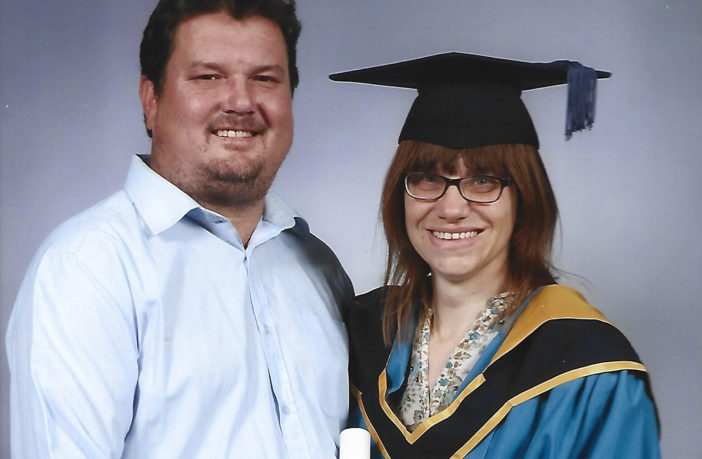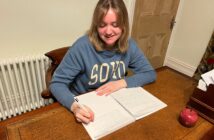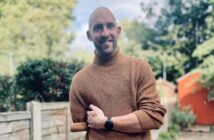Dawn Stewart is deputy ward manager at a busy mental health facility in Cambridgeshire. Having already gained a Master’s degree with The Open University, Dawn recently returned, adding Non-Medical Prescribing to her OU qualifications.
This time around, Dawn had more hurdles to overcome – continuing to study, work in nursing, and care for her children who both have additional needs throughout the pandemic. What kept her going? Dawn shares her story.
“I left school with no qualifications of any use,” says Dawn. “I fell into nursing and at first a lot of my motivation to study was to prove that I could. I know that I’m not daft, but I’m also not academically minded.”
After an access course, diploma, and degree, Dawn’s employer put her forward for a post-graduate certificate (or PG Cert) with The Open University. That quickly evolved to an MSc in Advancing Healthcare Practice, followed by a second PG Cert, this time in Non-Medical Prescribing.
Dawn’s studies had gained significant momentum. Then came the curveball: COVID-19.
Rise in mental health cases
The onset of the pandemic caused fear, worry and stress for everyone. For people living with mental health problems, it meant even greater challenges. Dawn remembers all too well when her ward first confronted COVID.
“The most difficult moment of my studies was studying through the pandemic whilst nursing in mental health,” she says.
“Not only were we managing COVID patients; we were managing COVID patients with psychosis and other mental health disorders. We were continuously over capacity and community services were unable to function effectively.”
Juggling complex childcare in isolation
Not only was Dawn stretched at work, but with two children with complex needs, the pressure didn’t ease at home.
“Fitting my studies in involved a lot of late nights,” she explains. “The days were too busy, with work and my two children with additional needs, both on EHCPs (Education, Health and Care Plans).”
“The one-to-one support their school provided stopped due to the isolation rules. I was busy trying to ensure their learning was not interrupted, as well as managing their health and social provision.”
“The OU has got you. They want you to succeed”
Drawn praises a supportive student group and ‘excellent’ tutors for helping her stick with her studies:
“The friendships that developed in the study group bolstered you when it was tough and the tutors were amazing.
“It was an OU tutor who spotted I had dyslexia during my Master’s,” she adds. “That was a turning point. Once I knew about it and put measures in place technology-wise, my marks improved, as did my confidence. It made a real difference.”
“To any student who might be struggling and thinking of giving up their studies I would say, you can do this. The OU has got you. They want you to succeed.”
Changing people’s lives
Proving she could do it may have been one of Dawn’s first incentives to study, but she’s since found an even stronger motivation for learning: “I’ve come to realise that with the right knowledge you have the power to change people’s lives for the good.
“Through my Master’s, I embedded a perinatal policy trust-wide to ensure pregnant women received joined up care. I shared research on using brief admissions to help people in a mental health crisis. I contributed to suicide risk planning so service users can have a workable crisis strategy.
“The non-medical prescribing qualification means I’m now able to improve the care experience by giving an immediate response to service users, while also having the time to look at their history and current needs so we can come up with a regime that works for them, in their lives.”
After achieving her latest qualification in a difficult 2021, Dawn reflects on just how valuable her studies have been for her career – and her personal growth:
“The OU has made all the difference to my life too. With my life as it is, there is no way I could have these qualifications without the OU, and I am using what I’ve learned every day of my working life,” she added.
“My advice to anyone thinking about studying with the OU is just go for it.”



